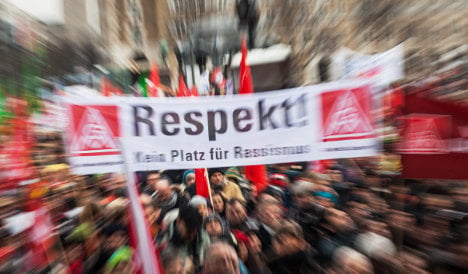Hate crime monitoring groups ReachOut and Berliner Register reported on Tuesday 320 incidents of assault in 2015, up from 179 in 2014. Twenty-five of the attacks last year were connected to anti-Semitism, compared to 18 the year before.
Most attacks (175) were connected to racism while 43 were against LGBT people.
Another 412 people were followed, threatened or hurt – of whom 42 were children. ReachOut said they were particularly alarmed by cases involving children, such as when a man uttered racial slurs to a mother holding a one-year-old baby and then pushed them, the baby falling from its mother's arms into its stroller.
Another case that made headlines across the country last year was when two neo-Nazis urinated on children riding Berlin public transport, hurling racist insults at them and their mother.
“It is especially appalling and brutal when racially motivated attacks are made against children,” said Sabine Seyb from ReachOut in a statement.
The report found a total of 1,820 hate incidents, including extreme right-wing, racist, homophobic as well as anti-Semitic motivations. The incidents ranged from violent attacks to “propaganda” such as stickers, graffiti and posters.
Propaganda made up the largest portion of the 1,820 incidents, at 683 reports.
“In this way, individual neighbourhoods can show the types of actions by neo-Nazis and everyday forms of discrimination that are not necessarily reflected in official statistics,” the report states.
Reports of anti-Semitism increase by one-third
The groups also reported 401 anti-Semitic incidents in 2015 – 34 percent higher than the number of incidents known in 2014 and more than twice the number of anti-Semitic crimes reported by Berlin police in 2014 (193).
Part of the reason for the higher number of reported incidents is that the group that collected the data, the city-sponsored Anti-semitism Research and Information Point (RIAS), only launched at the beginning of 2015 and thus did not collect reports during the year before.
RIAS allows residents to report any anti-Semitic incident, from verbal insults to written propaganda to violent attacks.
“The sharp increase in reports since the public announcement of the new reporting options simply shows that we are on the right course to discover the extent of anti-Semitism every day in our city,” said RIAS coordinator Benjamin Steinitz in a statement. “Although the number of 401 incidents is alarmingly high, we still assume that there are a large number of unreported cases.”
SEE ALSO: German Jewish groups fear rising anti-Semitism
Most of the anti-Semitic incidents recorded by RIAS were threats, insults or vulgar statements which accounted for 210 incidents, followed by property damage (72) and propaganda (68).
“Many Jewish people feel increasingly insecure in light of the growing attacks and anti-Semitic hostility on the street, in school yards and sports fields,” said Deidre Berger, director of the Berlin American Jewish Committee, in a statement.
Berger said she has observed the development of anti-Semitism in Germany for 30 years.
“More and more Jewish people report to us that they rarely or never identify themselves in public any more as being Jewish.”



 Please whitelist us to continue reading.
Please whitelist us to continue reading.